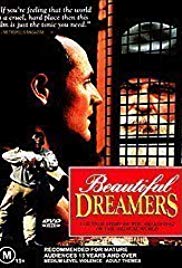These questions have two purposes. The first is to enhance students’ understanding of the film and their identification with Whitman. The second is to impart the information called for in the questions.
For these questions, there are generally no single correct answers. Instead, there are strong or weak answers depending upon the logic used and the evidence marshalled to support the response.
1. Early in the film, Dr. Bucke watches the treatment of the patient named Leonard Thomas, a character who is important throughout the film. Dr. Bucke tells Leonard that, “I believe we are doing this for your own good. ” Explain the irony in this statement.
Suggested Response:
Dr. Bucke does not believe that any of the harsh methods of treating the mental patients will work. In this statement he points out how the medical professionals are operating with the intention, however misguided, of helping the patients.
2. Dr. Bucke asks the bloodied surgeon if the operations performed on the patients improve their lives. The surgeon says he does not understand the question. What do we learn from his response?
Suggested Response:
We learn that the professionals treating the mental patients are concerned with relief of symptoms but do not factor into their practices the quality of life that may result from their methods.
3. When Dr. Bucke’s daughter is playing the piano, she shifts from a sedate tune to a jazz riff. Dr. Buck expresses delight; his wife objects. What is revealed in this scene?
Suggested Response:
This scene shows the attitudes of the wife, who represents the culture at large and is concerned with propriety, in opposition to the attitudes of Dr. Bucke, who is more playful and willing to show passion. Dr. Bucke’s attitude expresses the progressive philosophy of Whitman.
4. The lecture hall in Philadelphia illustrates the kinds of treatments available to mental patients at the time. How does Dr. Bucke respond, and what idea does he suggest that impresses Whitman?
Suggested Response:
Dr. Bucke feels shame and embarrassment and says that he is convinced that “feeling precedes thought.” He is suggesting that the current system of treatment robs patients of their dignity and that attention must be paid to their feelings.
5. Whitman plays with his apparently mentally handicapped brother in the scene in which Dr. Bucke visits his home. Whitman says to his brother, “You make me rich. Rich like a king.” This line is echoed later when Dr. Bucke comforts Leonard. What does repetition of the line reveal about Dr. Bucke?
Suggested Response:
Dr. Bucke has been learning a great deal from Whitman and is now applying these lessons to his methods of dealing with his patients; he understands the power of caring.
6. Dr. Bucke seems to be embarrassed about the injuries that have left him with a serious limp. When Whitman asks to see the wound and shows no repulsion, what lesson does Bucke learn?
Suggested Response:
Bucke learns not to feel ashamed of his deformity; he is not grotesque. Dr. Bucke is relieved of the burden of shame when Whitman says, “To hell with modesty, man. It never healed a person on this earth.”
7. As Whitman’s brother runs in playful circles around them, Dr. Buck listens to advice from Whitman. What is the advice?
Suggested Response:
Whitman says a person’s only duty is to love the earth, the sun and animals. He suggests that people should despise riches and “give alms to anyone who asks.” He tells Dr. Bucke to hate tyrants and to stand up for the weak and the stupid. “Take off your hat to nobody.” Whitman adds, “Don’t argue about God.” He also says that one should re-examine everything learned in school and throw out whatever insults the soul.
8. In the conversation with the journalist, Whitman explains his alleged atheism. How?
Suggested Response:
Whitman says that Jesus and the church “went and got divorced” but nonetheless the Bible is “the best book ever written.” He then tells the journalist what he does not believe: that God is a “petty minded crank” who punishes those people who strive to enjoy their time on Earth.
9. How does Whitman respond to the journalist’s criticism of America?
Suggested Response:
Whitman tells the journalist that he is not pleased with how his country “grows by the gun.” He points out that there is a difference between the government itself and the America he has in his mind which is a democracy made of all races of men and women.
10. When Reverend Haines expresses fear of Whitman’s ideas to the journalist, he says “It’s not the man that concerns me; it’s the voice.” What point is he making?
Suggested Response:
The pastor in concerned that Whitman is someone who will be heard because of his poetry. Whitman is respected, admired and loved. People will listen to his ideas because of who he is and how he expresses himself rather than because of what he says.
11. Soon after Mrs. Bucke leaves the outdoor table in objection to Whitman and her husband eating asparagus with their fingers, she drinks from a hidden bottle of alcohol. What irony can be found here?
Suggested Response:
Mrs. Bucke cannot let go of social conventions that steal away both abandon and joy. She mitigates this sense of restraint and the disappointments of her life through alcohol. There is a parallel between Mrs. Bucke’s drinking and the treatment of the patients in the asylum who are given alcohol to keep them sedated. It could be suggested that Mrs. Bucke is like the patients in her inability to live fully, a notion that is supported later in the film when she seeks help for her depression.
12. In the film’s presentation of Molly, the woman strapped to the chair and smacked with a wet towel, what point is being made about how insanity is defined?
Suggested Response:
Molly is overworked and miserable. She cannot cope with the life that she is forced to live and in her rebellion against the daily struggle she must face, she is brought to the asylum. The suggestion here is that life experiences, rather than internal organ disorders or moral failings may cause an individual to lose both control and perspective.
13. How does Whitman introduce Dr. Bucke to the concept of play as therapy?
Suggested Response:
After Whitman is told the reasons that Leonard is restrained and gloved, he comments, “Nobody has any fun around here.” Whitman then removes Leonard’s gloves and begins to play a game of catch with the wheelchair bound man. He says to Leonard, “You’re going to need a little practice.” Before long, Dr. Bucke has the patients playing cricket.
14. How does Whitman explain the resistance Dr. Bucke meets in his efforts to bring progressive methods of treatment to the asylum?
Suggested Response:
Whitman tells Dr. Bucke that people are afraid of change; he says that they do not know how to respond when they feel the sand shifting under their feet. He says that, “Democracy scares the pants off of them.”
15. When Whitman is invited to recite to the guests on the asylum lawn, he speaks a few lines from “Song of the Open Road,” an invitation to explore life. What is the effect of this poem on the listeners?
Suggested Response:
Some are perplexed; some do not seem to be sure they have actually heard a poem since Whitman’s style is unique and his content challenging. Mrs. Bucke seems to have heard the invitation to live more fully and after this point quotes from Leaves of Grass in several scenes.
16. In dispute with the journalist who is writing negative reviews of the progressive changes at the asylum, Dr. Bucke quotes from verse 48 of “Song of Myself”: “And whoever walks a furlong without sympathy walks to his own funeral dressed in his shroud.” What point is Dr. Bucke making through the use of Whitman’s words?
Suggested Response:
Dr. Bucke is seeking empathy from the journalist and in quoting this section of Whitman’s poetry he is alluding to the idea that all humans share humanity and none are better or worse than any other. Dr. Bucke wants respect for his patients.
17. In the scene at the river in which Mrs. Bucke finds her husband and Whitman singing opera and taking a mud bath, she seems to have some insight into the old poet’s mind. What do you think the film is suggesting in this scene?
Suggested Response:
Answers will vary. Some may think that Mrs. Bucke is projecting her own feelings of loneliness and isolation onto Whitman; others may think that the film is bringing up, however obliquely, the notion that Whitman was a homosexual and as such felt the social approbation of the times. (There is no documentation of Whitman’s homosexuality although it is generally extrapolated from his work.) Still others may suggest that Whitman experienced the loneliness of the mystic, the spiritual man in a material society.
18. In his poems of procreation, Whitman shows deep appreciation for both the passion and reproduction inherent in human sexuality. This is apparent in the film when Dr. Bucke recites the lines from Whitman’s poem, “A Woman Waits for Me”, calling for an end to shame. Why were such thoughts considered so radical at the time Whitman lived?
Suggested Response:
Answers may vary. Whitman wrote toward the end of what may be referred to as the Victorian Age with its well documented sexual repression. Even piano legs were covered during the years Whitman’s poems were being read. Whitman’s books were banned in several communities, and his references to sexuality were considered obscene by many civic and religious leaders.
19. What purpose is served and what lessons are learned from the cricket match held at the asylum picnic?
Suggested Response:
Dr. Bucke managed to show the townspeople that there was nothing to fear in his progressive treatment of the patients at the hospital. He also reiterated the value of play, despite the fact that according to Reverend Haines, mental patients playing cricket made “a mockery of man’s finest sport.” Even Dr. Bucke’s reluctant surgeon opens windows, takes off his jacket, and joins in the game.
20. When told about the changes apparent in the ethos of Whitman and in the ideas of Dr. Bucke, Reverend Haines, who had earlier excoriated the poet in a sermon, says: “There is a new blade in the guillotine and it is very, very sharp.” What warning is he giving to the mayor in this dialogue?
Suggested Response:
The guillotine was originally invented as a humane alternative to the agony of hanging. Execution by guillotine took just a second. The most frequent early use of the guillotine was during the French revolution when tens of thousands of aristocrats and royalist peasants were beheaded. Reverend Haines’ statement is an allusion to the French Revolution and the use of the guillotine to efficiently execute those who represented the old order. By referring to the guillotine, Reverend Haines is suggesting that persons such as himself who stand firm against what they see as destructive changes in the social system will be destroyed along with the old values that have stood in place for centuries.
21. See Discussion Questions for Use With any Film that is a Work of Fiction.



